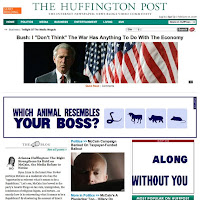 In 2004 after Bush and Cheney “won” another bitterly divided and contested election, Karl Rove heralded the dawning of a new "permanent Republican majority" driven by commitment to conservative cultural values at home and unwavering militarism abroad. Evangelical Christians in the American heartland along with suburban “soccer moms” (or what Sarah Palin calls “hockey moms”) were supposed to constitute the foot soldiers of Rove’s movement, which, in practice, was an extension of the “Reagan Revolution.” This Republican coalition was obviously not as strong as its leaders liked to suggest, and there is no doubt that the recent unpopularity of the Bush-Cheney regime contributed greatly to the GOP’s dramatically sudden demise (and certainly the ineffectual McCain-Palin campaign did not help the conservative cause, nor did the timing of the current financial crisis). Yet in the wake of losing the 2004 elections and facing four more years of Republican control in the White House and Congress, there was a concerted, and it now appears highly successful counter-movement launched by progressives who strategically chose to work with, if not from within, the Democratic Party.
In 2004 after Bush and Cheney “won” another bitterly divided and contested election, Karl Rove heralded the dawning of a new "permanent Republican majority" driven by commitment to conservative cultural values at home and unwavering militarism abroad. Evangelical Christians in the American heartland along with suburban “soccer moms” (or what Sarah Palin calls “hockey moms”) were supposed to constitute the foot soldiers of Rove’s movement, which, in practice, was an extension of the “Reagan Revolution.” This Republican coalition was obviously not as strong as its leaders liked to suggest, and there is no doubt that the recent unpopularity of the Bush-Cheney regime contributed greatly to the GOP’s dramatically sudden demise (and certainly the ineffectual McCain-Palin campaign did not help the conservative cause, nor did the timing of the current financial crisis). Yet in the wake of losing the 2004 elections and facing four more years of Republican control in the White House and Congress, there was a concerted, and it now appears highly successful counter-movement launched by progressives who strategically chose to work with, if not from within, the Democratic Party.The origins of this center/left coalition date most immediately to Howard Dean’s 2004 primary campaign during which he lost the nomination to John Kerry, but attracted media attention for having produced a largely youth-based, internet-run campaign that called for ending the Iraq War and drawing national focus towards such issues as health care, education, and energy reform. Not nearly as radical as the platforms of progressives like Nader or Dennis Kucinich, Dean’s ideas caught-on within mainstream liberal circles for this exact reason. As such, the Dean approach became a viable third-way between excessive compromise and excessive purism. This was at least the perspective of groups like MoveOn.org, which generated a great deal of grassroots enthusiasm for Dean’s campaign in large part as a refocusing of antiwar activity that had tried and failed in March 2003 to affect a change in policy by staging massive 1960s-style street demonstrations against the invasion of Iraq.

The Dean campaign offered a bottom-up organizing and fund-raising model that became a potent antidote to Karl Rove’s political machinery. Especially in the wake of their 2004 electoral defeat, activist Democrats in groups like MoveOn and Daily Kos (founded in 2002) redoubled their efforts to promote liberal and progressive media outlets while developing and strengthening new left-leaning think-tanks and policy groups designed to refurbish the infrastructure of Democratic electoral politics. For instance in 2003 former Clinton chief of staff John Podesta founded the Center for American Progress (CAP) as a means of directly countering the influence exercised by conservative groups like the Heritage Foundation and the American Enterprise Institute (AEI). Dean, meanwhile, became chairman of the Democratic National Committee (DNC) in 2005 and began pursuing a “fifty-state strategy” designed after the goals of his presidential campaign. Dean’s party leadership produced the opening salvo of the GOP’s demise during the 2006 mid-term elections, when Democrats regained control of both the Senate and the House. It is difficult to say how much of the antiwar left participated in this electoral repudiation of the Republicans, but it was widely believed that the Democratic victory clearly signaled a public mandate to end the Iraq War. When the new Democratic Congress subsequently failed to deliver on this promise, there was a logical conclusion among many that only a change of power in the White House would allow the antiwar/progressive wing of the party to make any real policy difference.
 Another key factor in the emergence of this new center/left formation has been a vibrant constellation of media outlets connected to, but also distinct from the growing liberal and progressive “blogoshpere.” Amy Goodman’s Democracy Now!, a news magazine that originated in 1996 through New York’s Pacifica Radio affiliate and now broadcasts on over 700 public radio and television stations, as well as the internet, bills itself as the “largest community media collaboration in the United States.” Democracy Now! has become a leading communications medium for progressives and some radicals affiliated with the alternative/IndyMedia movement, including activists aligned with both the Democratic and Green Parties.
Another key factor in the emergence of this new center/left formation has been a vibrant constellation of media outlets connected to, but also distinct from the growing liberal and progressive “blogoshpere.” Amy Goodman’s Democracy Now!, a news magazine that originated in 1996 through New York’s Pacifica Radio affiliate and now broadcasts on over 700 public radio and television stations, as well as the internet, bills itself as the “largest community media collaboration in the United States.” Democracy Now! has become a leading communications medium for progressives and some radicals affiliated with the alternative/IndyMedia movement, including activists aligned with both the Democratic and Green Parties.At the same time, a somewhat surprising avenue of critical left-leaning commentary has emerged on MSNBC, a cable news collaboration between NBC (General Electric) and Microsoft. The network began operating in 1996, the same year that FOX News went on air, and its current flagship program Countdown with Keith Olbermann began in 2003. Having become known for his scathing criticism of the Iraq War and virtually every policy of the Bush-Cheney regime, Olbermann offers his outspoken political commentary and news coverage within a humorous and often fiercely satirical format designed to attract younger viewers and people who want to be entertained as well as informed. That said, Olbermann and his frequent guests from Newsweek (Richard Wolfe), The Nation (Christopher Hayes), and the Washington Post (Eugene Robinson), for example, combine liberal and progressive analyses presented in an intellectually stimulating manner.
 Having first been a contributor and guest-host on Countdown, former gay rights (ACT UP!) activist Rachel Maddow recently began hosting her own show following Olbermann; The Rachel Maddow Show has become one of MSNBC’s top-rated programs while Maddow continues hosting her daily show on Air America Radio, a nationally syndicated liberal and progressive “talk-radio” network launched in 2004 as a potential antidote to the popularity of conservative voices like that of Rush Limbaugh. Both Olbermann and Maddow are openly supportive of Obama while also being critical of his more conservative tendencies. MSNBC is earning a reputation as the diametric opposite of FOX News—owned by Rupert Murcdoch’s News Corporation—which functions essentially as a rightwing propaganda outlet and makes very little effort to disguise its ideological bent. Other significant elements of this left-leaning media constellation include news/commentary websites such as The Huffington Post.com, Common Dreams.org, and TruthOut.org.
Having first been a contributor and guest-host on Countdown, former gay rights (ACT UP!) activist Rachel Maddow recently began hosting her own show following Olbermann; The Rachel Maddow Show has become one of MSNBC’s top-rated programs while Maddow continues hosting her daily show on Air America Radio, a nationally syndicated liberal and progressive “talk-radio” network launched in 2004 as a potential antidote to the popularity of conservative voices like that of Rush Limbaugh. Both Olbermann and Maddow are openly supportive of Obama while also being critical of his more conservative tendencies. MSNBC is earning a reputation as the diametric opposite of FOX News—owned by Rupert Murcdoch’s News Corporation—which functions essentially as a rightwing propaganda outlet and makes very little effort to disguise its ideological bent. Other significant elements of this left-leaning media constellation include news/commentary websites such as The Huffington Post.com, Common Dreams.org, and TruthOut.org.Perhaps the most interesting development of all within this context has been the large national and international popularity of the Comedy Central Network’s “fake news” programs, The Daily Show with John Stewart (1999-present) and The Colbert Report (2005-Present). Appealing initially to younger aud
 iences who took no interest in the stale format of television news, John Stewart and Stephen Colbert’s programs have helped re-shape the commercial media landscape by offering brilliant and often hilarious political/social satire that has been devastatingly critical of Bush and Cheney while providing real news analysis embedded within the framework of satirical comedy sketches. Stewart delivers an openly left-leaning nightly “fake news” cast that parodies cable news programs by making fun of how they sensationally cover events of the day. The latter third segment of The Daily Show consists of guest interviews often featuring political leaders, for instance former Pakistani President Pervez Musharraf appeared with Stewart in September 2006, and Barack Obama made his forth overall appearance (this one by satellite) on the Thursday prior to his being elected President. Stephen Colbert spun his program off from his role as a correspondent on The Daily Show, and very effectively plays an ultraconservative FOX News-like television host who refers to FOX's Bill O’Reilly as “papa bear.” Although it can easily be overstated, one should not underestimate the influence of Stewart and Colbert in terms of connecting with and informing young people while contributing to the foundation of a newly awakened progressive political culture with media icons ranging from Amy Goodman to Rachel Maddow.
iences who took no interest in the stale format of television news, John Stewart and Stephen Colbert’s programs have helped re-shape the commercial media landscape by offering brilliant and often hilarious political/social satire that has been devastatingly critical of Bush and Cheney while providing real news analysis embedded within the framework of satirical comedy sketches. Stewart delivers an openly left-leaning nightly “fake news” cast that parodies cable news programs by making fun of how they sensationally cover events of the day. The latter third segment of The Daily Show consists of guest interviews often featuring political leaders, for instance former Pakistani President Pervez Musharraf appeared with Stewart in September 2006, and Barack Obama made his forth overall appearance (this one by satellite) on the Thursday prior to his being elected President. Stephen Colbert spun his program off from his role as a correspondent on The Daily Show, and very effectively plays an ultraconservative FOX News-like television host who refers to FOX's Bill O’Reilly as “papa bear.” Although it can easily be overstated, one should not underestimate the influence of Stewart and Colbert in terms of connecting with and informing young people while contributing to the foundation of a newly awakened progressive political culture with media icons ranging from Amy Goodman to Rachel Maddow.Barack Obama’s rapid ascendancy is in many ways connected to this conjuncture; his public opposition to the invasion of Iraq in 2002—while still a state senator—propelled him to victory in the Democratic primary over Hillary Clinton, who had been the odds-on favorite to win the nomination but whose vote to authorize funding for the war made her highly vulnerable. At the same time, while eventually gaining strong support from the corporate/financial sector, Obama’s campaign first developed along the lines of the Dean model and was able to build an unprecedented grassroots mobilization that capitalized on the Illinois Senator’s personal charisma and political savvy. As the campaign progressed, the idea of President Barack Hussein Obama became a powerful national and international symbol for generational, racial, and political transformation. In this manner, the global social movement that arose in support of Obama drew rhetorical strength from articulating this moment in history as an opportunity to reengage the fulfillment of Martin Luther King’s “Dream,” which in its broadest sense is a vision of a world free from racism, militarism, and poverty.
If this is a highly sympathetic and perhaps exaggerated portrayal of the nascent possibility presented by an “Obama Revolution,” it is presented in order to do justice to the tremendous significance of what occurred on November 4, 2008. Voters in the United States did not just elect the first African- American president, although the image of the Obama family on stage in Grant Park and their imminent arrival in the White House is surely historic. But there was a much larger, indeed a global victory against the forces of reactionary hatred being celebrated by weeping students at Spellman College in Atlanta and jubilant crowds in Harlem; a throng of hope-filled revelers surrounding the White House and spilling into city streets across the country. In Kenya (where a national holiday was declared), Indonesia, Japan, throughout Europe, both Israel and Palestine: the world celebrated hope having triumphed over fear.
There are, of course, serious questions about how far to the left of center Obama’s administration and the Democratic Congress will venture. John Podesta now leads the Obama transition team, and has helped install another former Clinton-insider as the new White House chief of staff, Rahm Emanuel, who is reviled by many progressives for his hawkish stance on Middle-East issues. These developments do not bode well for an immediate and decisive break with the status-quo, but neither do they preclude the development of a center/left coalition in alliance with supportive elements within the Obama orbit. It will obviously be essential to maintain a parallel track of organizing from outside the system, and in this sense there are already a number of arenas in which the left should begin articulating an oppositional stance to the new administration, the war in Afghanistan for instance. With Emanuel now in-place one might also imagine that Israel-Palestine policy could soon become a contentious issue. In fact, Emanuel’s selection may represent how the centrist Democratic Leadership Committee (DLC) associated with the Clintons is attempting to assert control over Obama’s agenda, which might otherwise lean in a more progressive direction closer to Dean’s wing of the party.
Nonetheless, the Obama campaign as a social movement has reopened space for public participation and progressive agitation. At the same time, the current financial meltdown has ignited the possibility of organizing a reformist coalition around the goal of pressuring for an FDR-like “Green New Deal” whereby current economic and environmental crises can be addressed through a strategically designed green jobs, infrastructure, and social services program that would aim to slowly dismantle the national security state by diverting resources to an ascendant environmental/welfare state. There is no guarantee that such a movement could be successfully built and/or maintained in the coming months and years—indeed, there is much reason to believe that Obama will be a disappointment to the left on several fronts, from trade and corporate taxes to military spending. And yet, the new President-elect set the stage rhetorically for what may be possible in the days ahead: “this victory alone is not the change we seek — it is only the chance for us to make that change. And that cannot happen if we go back to the way things were. It cannot happen without you.”



